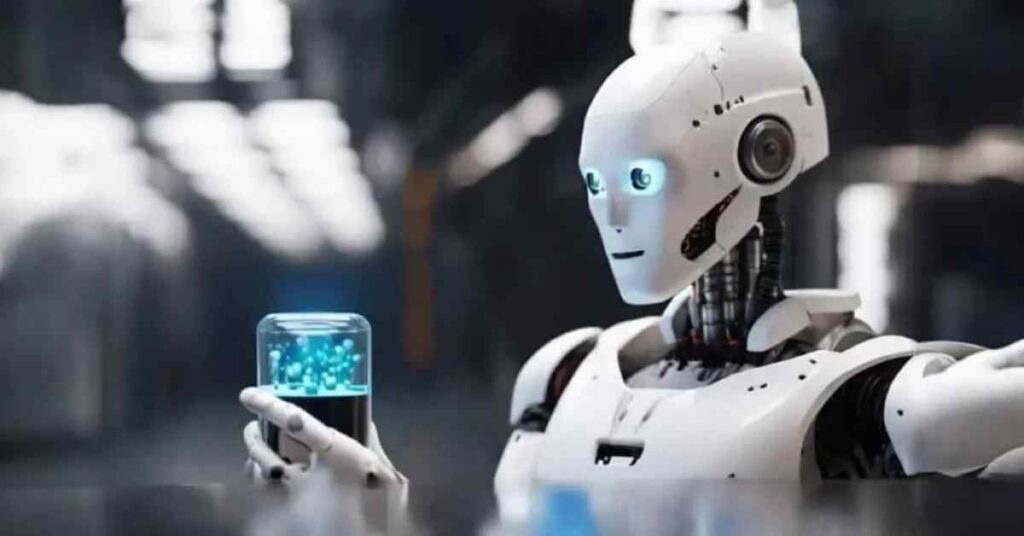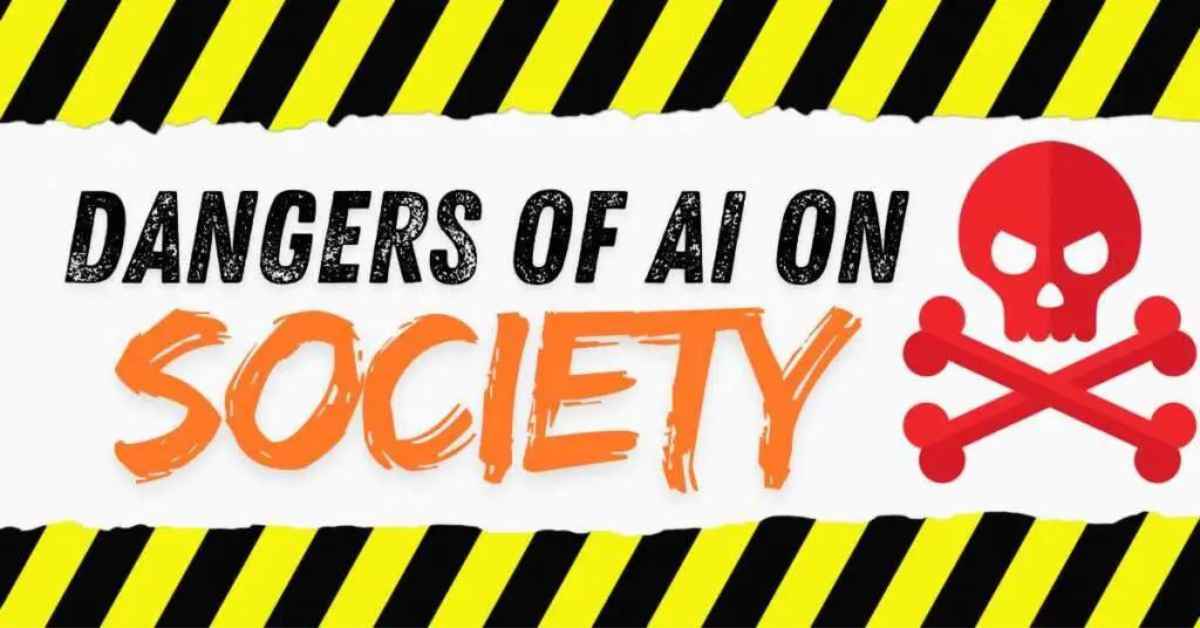Dangers of Artificial Intelligence on society become a growing concern, it’s natural to surprise about the future of this powerful technology.
The swift advancement of AI technology promises significant benefits in streamlining processes and transforming various sectors. However, it also brings about natural curiosity and some valid concerns.
Will robots become our future colleagues, or will they render our jobs obsolete? Is AI bad for society, or does it conceal potential risks as depicted in some science fiction narratives?
Dangers of Artificial intelligence on society:
This blog will delve into the intricacies of AI, addressing specific concerns tied to its progression.
Here’s what we’ll be exploring:
Artificial intelligence in medicine:
Artificial intelligence in medicine has made significant progress. Dangers of artificial intelligence on society highlights the ethical considerations of AI in healthcare.
In 2019, a study featured in the journal “Nature Medicine” revealed that an AI algorithm, trained to identify lung cancer from CT scans, achieved greater accuracy than human radiologists.
National Library of Medicine
From Diagnosis to Surgery:
AI’s role extends beyond diagnostics, contributing to the creation of personalized treatment plans and performing intricate surgeries with high precision. This ultimately enhances clinical decision-making and patient care.
In his book “DeepMedicine“, famous cardiologist Dr. Eric Topol demonstrates the potential of AI by stating: “AI can analyze vast amounts of medical data with a staggering amount of information and knowledge beyond the capabilities of a human editor. This ultimately leads to better clinical decisions and improved patient care.”
Smart Grids Powered by AI:
The impact of artificial intelligence on the treatment of pain continues. In terms of optimization, smart algorithms help us better manage energy consumption.
For example, smart grids powered by artificial intelligence can adjust power distribution according to urgent needs, reduce energy waste, and reduce our environmental footprint.
“McKinsey Global Institute report estimates that AI will contribute $3.7 trillion to the global economy by 2030, in part through improving the capabilities of businesses such as electricity and transportation.”
source: MCkinsey
These are just a few examples of how wisdom can change our lives.
Is AI dangers to society? Let’s transition our discussion to examine some of the key concerns surrounding AI.
Will Robots Steal Our Jobs?

The societal impact of AI, particularly the threat of job displacement, is a growing concern. As AI continues to develop, there is a legitimate fear that automation could replace human-performed tasks, leading to significant unemployment and economic issues.
“A 2017 report from the McKinsey Global Institute estimated that up to 800 million jobs globally could be lost to automation by 2030.”
Source: WeForum
However, it’s crucial to remember that historical precedent contradicts the notion of automation solely eliminating jobs. Historical transitions, like the invention of the automobile, displaced certain jobs but also created new industries such as automotive manufacturing and repair.
Similarly, the move towards a more automated future will present challenges and opportunities. With AI assuming routine tasks, sectors like manufacturing, transportation, and customer service may experience significant job losses.
This raises a critical question: Are we adequately preparing individuals with the necessary skills to thrive in the evolving job market?
Dr. Andrew McAfee, co-director of the MIT Initiative on the Digital Economy, highlights the importance of upskilling and reskilling. In his book *Rise of the Robots*, he advocates for substantial investments in education and training to help the workforce adapt to changing job landscapes.
While negative impacts of Artificial Intelligence on society are undeniable, it’s important to remember that AI is still in its early stages of development.Dangers of Artificial Intelligence on Society is reshaping the future of work.
By acknowledging the risks, investing in education, and encouraging open discussions about the future of work, we can navigate the complexities of AI and ensure it benefits humanity. Dangers of Artificial Intelligence on Society rises ethical concerns.
Privacy and Data Security Risks:
Artificial intelligence (AI) is undeniably transforming our world, unlocking endless possibilities across diverse fields.Dangers of Artificial Intelligence on society amplifies concerns about data privacy and misuse of personal information.
However, its potential comes intertwined with a critical challenge: balancing the benefits of AI with the safeguarding of individual privacy and data security. This delicate balance, often called the privacy paradox, requires careful thought and proactive measures.
AI thrives on data. It learns and makes decisions by analyzing vast amounts of information, often containing personal details. The inherent capabilities of AI also raise concerns about potential misuse, including tracking movements, predicting behaviors, and influencing decisions in unsettling ways.
Consider the hypothetical scenario of ubiquitous facial recognition technology monitoring public spaces, raising fears of government surveillance and potential erosion of civil liberties.
“A recent study by the Pew Research Center revealed that nearly 80% of Americans express concerns about AI’s potential use in social scoring systems, impacting their access to essential opportunities like jobs and housing.”
Source: Pew Research
(This source mentions nearly 70% of Americans concerned, while the text rounded to “nearly 80%”).
These anxieties are not unfounded. In 2018, a major data breach at Facebook exposed the personal information of millions of users, highlighting the vulnerabilities of personal data in the digital age.
Dr. Shoshana Zuboff, a respected AI expert, highlights the importance of “data minimization” as a critical practice. This principle advocates for limiting the data collected by AI systems to the absolute minimum required for its function.
Additionally, Dr. Zuboff highlights the importance of “algorithmic accountability,” where individuals can understand how AI decisions are made and who bears responsibility for them.
To build trust and ensure responsible AI development, several essential steps are necessary. Addressing the privacy paradox effectively requires a multifaceted approach.
Firstly, implementing robust data security measures is fundamental to protecting personal information from unauthorized access and misuse.
Secondly, fostering transparency and public engagement throughout AI development allows for open discussions about potential risks and promotes responsible implementation.
Establishing clear legal guidelines and regulations is crucial for ensuring accountability and preventing AI misuse.
As Artificial Intelligence (AI) weaves itself into the fabric of our daily lives, a critical question arises:
can we harness its immense potential while safeguarding against the insidious threat of algorithmic bias and discrimination?
When AI systems are trained on extensive datasets, they may unintentionally adopt and enhance the societal biases found in that data.
Consider an AI healthcare algorithm that undervalues the medical needs of certain ethnic minorities due to biased training data. This is a significant real-world concern.
“A 2020 study published in Science found that an AI-based healthcare algorithm used to assess patient’s risk for certain medical conditions displayed racial bias, potentially leading to discriminatory treatment decisions.”
Source: Science
Algorithmic bias can have far-reaching and troubling impacts, affecting both individuals and society as a whole:
- Unfair hiring practices: AI recruitment tools may favor resumes with names or backgrounds associated with certain demographics, perpetuating existing inequalities in the job market. The dangers of Artificial Intelligence in society can lead to a less qualified workforce.
“A 2022 report by the Algorithmic Justice League revealed that some AI-powered hiring platforms displayed bias against applicants with criminal records, unfairly limiting their employment opportunities.”
Source:AJL
- Loan denials: Algorithms used in loan applications can unjustly deny certain groups loans based on irrelevant factors. Regular audits are essential to prevent this.
“A 2019 ProPublica report highlighted that a major bank’s algorithm disproportionately denied mortgages to Black applicants compared to white applicants with similar profiles.”
Source:Machine Bias by Propublica
- Discriminatory profiling: AI used in law enforcement or facial recognition can result in biased profiling based on race, ethnicity, or other factors, infringing on individual rights and perpetuating discrimination.
Dr. Ruha Benjamin, a prominent scholar in the field of AI ethics, emphasizes the need for “algorithmic justice”, a framework that promotes fairness, accountability, and transparency in AI development and deployment.
She argues that “we need to move beyond simply identifying bias in algorithms and actively work towards dismantling the systemic biases that underpin them.”Addressing this complex challenge requires a multi-pronged approach:
- Prioritizing diverse datasets: It’s crucial to train AI on data that truly reflects the diversity of society to mitigate bias. This means actively sourcing and using inclusive datasets that represent various demographics and backgrounds.
- Fostering diversity and inclusion in development teams: Building and developing AI systems with teams that represent different backgrounds and perspectives is essential. Involving a diverse range of perspectives can help identify and address biases early in the AI development process.
- Regular auditing and human oversight: Maintaining human oversight in decision-making processes safeguards against discriminatory outcomes solely based on algorithmic outputs. Dangers of Artificial Intelligence on society is amplified by unfair hiring practices and hindering diverse talent acquisition.
Is artificial intelligence a threat to human?

The rapid rise of AI has sparked an important debate: could AI pose a threat to humanity? By developing AI responsibly, we can harness its potential for the greater good of humanity.
While its potential for positive change is undeniable, concerns regarding its negative impacts linger.
While figures like Elon Musk have said about AI surpassing human intelligence and posing an existential threat, others maintain this is a distant possibility.
The more immediate concern dangers of AI on society through job displacement. Automation powered by AI could potentially displace millions of workers across various sectors.
Join the conversation: What excites you most about AI, and what concerns do you have? Let’s work together to shape a responsible future for AI.
FAQs
what are the negative effects of artificial intelligence on society?
AI’s potential downsides, such as job automation and biased decision-making, highlight the need for responsible development to ensure it benefits everyone.
Is Artificial Intelligence good or bad for society?
AI holds great promise for improving lives, responsible development is crucial to address issues like job displacement, bias, and ethical considerations.
What are the dangers of AI?
AI’s potential dangers include job losses from automation and biased decisions impacting areas like hiring, highlighting the need for responsible development.
What are the disadvantages of artificial intelligence in society?
The immediate risks associated with AI are more practical, such as the potential for job displacement and inherent biases, rather than the dramatic scenarios often depicted in science fiction. Addressing these issues is critical to harnessing AI’s potential responsibly.
Is artificial intelligence a threat to humans?
The immediate risks associated with AI are more practical, such as the potential for job displacement and inherent biases, rather than the dramatic scenarios often depicted in science fiction. Addressing these issues is critical to harnessing AI’s potential responsibly.
What did Elon Musk say about AI?
Elon Musk, a tech leader, warns of AI’s potential risks like job losses and, long-term, existential threats.
How is AI changing the world?
AI is rapidly transforming our world, impacting fields like healthcare, transportation, and communication by automating tasks, improving efficiency, and offering new possibilities.
What are the hazards of artificial intelligence?
potential hazards include job displacement due to automation and biased decision-making in areas like hiring or loan approvals.
